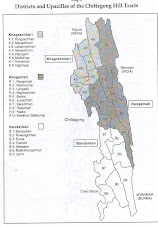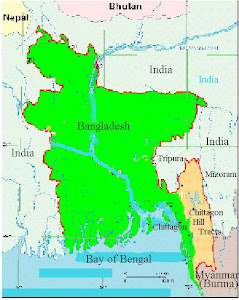THE CHITTAGONG Hill Tracts is currently witnessing an orgy of land grabbing. Since the state of emergency was imposed in the country on 11 January 2007, hundreds of acres of land belonging to the Jumma people have been taken away by force by the illegal plain settlers. The settlers also threaten to grab more. The situation has come to such a pass that they can take away any land from any Jumma any time with total impunity. A dark cloud of hopelessness and despair has descended on the Jumma people.
What is the pattern of the recent land grabbing? Are the settlers taking away other people's lands on their own? Who are backing them? These are some of the questions that crop up as we try to understand the problem.
Common sense tells us that without the backing of a powerful entity forcible grabbing of land can never take place on a large scale. Examples galore. In the case of the Chittagong Hill Tracts, it is the army which has orchestrated the recent land grabbing. As is evident from the reports of the Hill Watch Human Rights Forum, which has documented most of the recent cases of land grabbing, Dighinala and Maischari have been the epicentres of the vicious land grabbing in Khagrachari district. In both areas, the army was directly responsible for the planning and execution of the land grabbing schemes. Major Qamrul Hassan from Dighinala zone became notorious for inciting illegal plain settlers to grab Jumma people's lands. His men organized so-called arbitration meetings and distributed lands among the settlers after taking them away from the Jumma owners by sheer force of arms. The Jummas produced title documents pertaining to the said lands, but the army brushed them aside. This was in flagrant violation of the law of the country and military discipline. Yet, he and hit cohorts are not known to have been punished or disciplined for it. He was also the mastermind behind the failed attempt in August - September 2007 to capture 300 acres of land in Sadhana Tila in Babucharia that houses a Buddhist meditation centre and a sizable Jumma settlement. Hundreds of settlers, mostly from Merung area, were organised and sent to Sadhana Tila to forcibly occupy the land. Simultaneously, the Major used a tactic of threat and intimidation and tried to coerce the Headman of the area into agreeing to aid the illegal settlers in their misadventure. However, the Jumma people put up a stiff resistance and forced the Major and his "settler soldiers" to retreat. But the army refused to give up so easily. They got false land documents prepared with the help of the Dighinala TNO and filed a law suit against the Sadhana Tila Temple committee. The case is now pending with the Khagrachari district court.
Almost a similar storyline developed simultaneously in Maischari. In Maischari and its three other contiguous Unions under Khagrachari district, a total of 399.22 acres of land belonging to the Jumma people were taken away in a span of nine months from 3 March to 3 December 2007. Here too, the army played the most crucial role in organising the land grabbing sprees. They gathered the settlers around their camp and then pushed them to encroach on Jumma people's land. The tactic of threat and intimidation was also widely applied to silence the Jumma people of the area. A climate of fear was created by raids and house-searches and arbitrary arrest, detention, torture and harassment of innocent villagers. The army reportedly threatened to kill Kalibandhu Tripura of Noonchari Tholipara village for protesting against the grabbing of his land by a Bengali settler named Hazor Ali. Many Jumma youths were arrested and badly tortured apparently to create a fear psychosis and fence off any potential resistance to the expansion of Bengali settlements.
Nonetheless, the Jummas refused to take the mounting injustice lying down. In protest against the illegal land grabbing in Maischari, UPDF sent an urgent letter to the Deputy Commissioner of Khagrachari on 21 November 2007. On 9 December, the victims held a press conference in Dhaka and called upon the government to address the scourge. Despite that, the army shows no sign of relenting. On 8 December 2007, Major Gaffar, second-in-command of Mahalchari Army zone, exerted pressure on Niroti Chakma, headman of Ugudochari Mouza, to agree to their plan to create a new Bengali settlement in his area. Mr. Chakma refused, but the army keeps on putting pressure on him. On 12 December, Major Azad of Mahalchari zone put pressure on Monotosh Chakma, an Election Commission appointed Field Supervisor for Mahalchari area, to enlist illegal plain settlers as permanent voters of Ward No. 5 under Kiang-ghat Union, although there is not a single settler house in that area. Earlier, the army forced the Election Commission officials to appoint a Bengali settler as a field enumerator in violation of its own rules.
Therefore, anger and discontent over army-driven land grabbing continue to grow faster in CHT. A communal riot was narrowly averted in September in Dighinala. It was a close shave. If the army does not stop land grabbing, the situation will sure to deteriorate further leading to unpleasant developments. Therefore, timely government intervention has become urgent to address the issue without further delay.
Source from-Hill Watch Human Rights Forum
skip to main |
skip to sidebar


Map of Bangladesh

CHTs is number one Milliary zone in the world


Ministry of Chittagong Hill Tracts Affairs
The United Nation
The IJPMNA
This page provides information of the minority Indigenous Jumma Peoples in Chittagong Hill Tracts (CHTs) Bangladesh.
Contact with this please write:-ijpnusa@yahoo.com
Contact with this please write:-ijpnusa@yahoo.com
About Us
Location of Jummaland

Jumma Videos
- The BANDARBAN SADAR
- The Rowangchari
- The Ruma
- The Lama
- The Thanchi
- The Alikadom
- The Naikhkhongchari
- The RANGAMATI SADAR
- The Baghaichari
- The Langudu
- The Nanyachar
- The Barkal
- The Jurachari
- The Bilaichari
- The Kaptai
- The Rajsthali
- The Kawkhali
- The KHAGRACHARI SADAR
- The Manikchari
- The Laksmichari
- The Mahalchari
- The Matiranga
- The Ramgarh
- The Dighinala
- The Panchari
Audio & Video
Jumma Natok (Drama)
International Support
Educational Institution
Religious Organization
Buddhist Studies

Map of Bangladesh
Mission of Bangladesh
About Bangladesh
Bangali Audio Songs
Bengali News

CHTs is number one Milliary zone in the world
Online Audios
Refugee in Homeland

Jumma Picture

Blog Archive
About Me
- The Indigenous Jumma Peoples Movement in North America
- The Chittagong Hill Tracts (CHT) region comprises three districts: Banderban , Khagrachari and Rangamati. The districts comprise seven main valleys formed by the Feni, Karnafuli, Chengi, Myani, Kassalong, Sangu and Matamuhuri rivers aid their tributaries and numerous hills, ravines and cliffs covered with dense vegetation, which are in complete contrast to most other districts of Bangladesh, which consist mainly of alluvial lands. Geographically the CHT can be divided into two broad ecological zones: (a) hill valley, (b) agricultural plains. It is surrounded by the Indian states of Tripura on the north and Mizoram on the east, Myanmar on the south and east and Chittagong district on the west.
